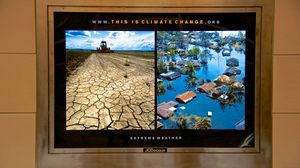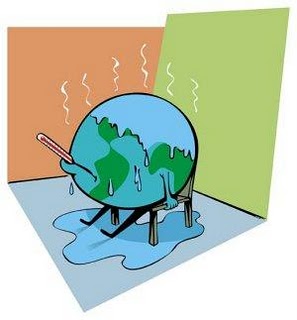User:Tonymays/Climate change champion
Becoming a Climate Champion: A Climate Emergency Course for Young People
About this Course
Becoming a Climate Champion: A Climate Emergency Course for Young People has been produced by the Commonwealth of Learning in collaboration with several of its open schooling partners. The curriculum at the schooling level is slow to change but as you will learn, climate change is a very real and very important challenge, perhaps the MOST important challenge. As an open scholar and a young adult, you have a vested interest in seeking to understand and to mitigate the impact of climate change since it affects your present and also your future. As an open scholar, you also get to choose what you want to learn, when you want to learnt and how you want to learn.
You can work through the course content alone or with others with whom you can share ideas.
You can work entirely offline or entirely online or in blended mode if your local open school provides such an option.
Modules are structured in the same way, as outlined below.
The course content
The course is broken down into Modules each with three lessons. Each lesson comprises:
- An introduction to the unit content.
- Unit outcomes.
- Key terminology to be mastered.
- Core content of the unit with a variety of learning activities.
- A unit summary.
- Assignments and/or assessments, as applicable
Introduction
Welcome to Becoming a Climate Champion: A Climate Emergency Course for Young People.
This course introduces you to key concepts of climate change and climate change action to safeguard the future, to enable you to better understand, participate, and contribute. By the end of the course, you should feel far more comfortable talking about, and taking action on, climate change. You will be well on your way to becoming a Climate Champion. Becoming a Climate Champion — is this course for you?
Climate change is the greatest threat that humanity has ever faced. It makes no sense to sugar-coat that frightening truth. We speak to you as adults, albeit mostly young adults, who are facing a future of climate destabilisation and ecosystem breakdown. We have attempted to ensure that this course is always honest with you about the state of the climate – even though that is changing (in other words, worsening) very rapidly. The goal is to empower you to take action on climate change and perhaps even become a climate change "champion" – a leader of others and an advocate for the rest of Nature; for that you must understand the urgency of the climate emergency.
Timeframe
How long? You will probably need about seven weeks to complete the whole course. Each module has three lessons in it. Each lesson usually has three parts to it with learning activities sprinkled throughout. You will be learning from readings, videos, practical activities, reflections, short quizzes, and optional discussions with others. Examples, scenarios and case studies come from several different countries around the world. We picture that each lesson will take you one to three hours to complete, but of course that depends on you and your schedule (and the length of the lesson, of course). Take as much time as you need.
Study skills
Because the course is self-paced, you will need to manage your time. Try to find a regular time during the day when you can engage with the course content. For some of you this might be in the evenings, early in the morning or even at night. Try not to work on the course for more than one hour at a time and make sure you stand and move around between study sessions. Because you will usually be working from home, you need to manage your workspace. Try to find a space with good light, a comfortable chair and a table and where you have internet access. If you are keeping a written journal, make sure you have pen and paper. If you are creating a digital journal, we suggest you organise it by module and lesson in the same way as the course is organised. Because the course makes use of a lot of internet resources, you will require good internet navigation skills. Note that all links were active at the time the course was created but over time some of the links might become broken. If you note who or which organisation created the original content, you might like to search for their name on the internet and see what they are currently sharing. You might also find it useful to search online for guidelines related to other study skills such as mind- or concept-mapping, blogging, digital journal keeping, creating e-portfolios etc.
Need help?
This course has been set up as a self-directed course that can be taken individually or as part of a team.
Your open school might provide a facilitator if the course is offered in blended or online mode – so find out how and when you can communicate with that person. If a discussion forum has been set up for the course, you can reach out to others that way.
You might be working completely independently. If the latter is the case, we suggest that you sometimes talk over your learnings and responses to learning activities with a family member or friend.
We have, in most cases, chosen short videos in case there are internet bandwidth or accessibility issues. (Even rural areas in highly developed countries still struggle with this problem.) If you have problems watching the videos, a short synopsis (summary) of each one is provided in an appendix to the course. Our apologies for any advertisements that pop up when you watch a video, but we cannot control those. Also, you can adjust the playback speed and/or turn on subtitles/captions, which are – sometimes comically – not always reliably correct!
In cases where we have summarised, paraphrased or cited a published report, we have provided a link to the full report, if available online, in the references section.
Our advice is that you start at the beginning and work your way through the course modules in sequence, but this is not actually necessary. Each module stands quite well on its own.
Learning Journals/Forums
There are learning activities in each lesson of each module in this course. It is usually suggested that you write your answers in your Learning Journal, which can be a notebook with handwritten notes, or a digital document file in which you type your answers. In either case, please remember to save your responses. You can write any climate action ideas in your Learning Journal, as well (perhaps highlight them, or put them in a separate section to make them stand out). Later in the course, you will be asked to look over your course notes, and you might want to study them to do well on the quizzes.
The notes in your Learning Journal can be used as the basis for Forum posts in contexts where the course is offered online.
How This Course Will Help You Become a Climate Champion
This course will not teach you absolutely everything you could learn about climate change, but it will teach you enough to understand why we all need to take action. It is filled with examples of what others are doing, tips and tricks, resources, as well ideas and suggestions for climate action.
One thing to do is notice which module(s) and which movies and readings resonate the most for you, make your heart sing, or light your dreams and creativity on fire. That might be the place (issue, topic) where you want to start your journey as a Climate Champion.
| Module | Your learning purpose |
|---|---|
| Module 1 – Climate Change Science | You might want to become someone who helps others understand the science of climate change. |
| Module 2 – Impacts and Consequences of Climate Change | You might want to help people grasp the extreme climate change events heading their way. |
| Module 3 – Climate Justice | You might want to work in a social services / helping field. |
| Module 4 – Climate Change Mitigation | You might want to become a policymaker with your government, or work on mitigation projects with your hands. |
| Module 5 – Intersectionality | You might want to work with vulnerable people. |
| Module 6 – Adaptation and Resilience | You might want to work in Emergency Services. |
| Module 7 – Action for Climate Empowerment | You might enjoy becoming an organiser extraordinaire. |
One Last Thought on Resilience … Your Resilience
Although building resilience to climate change impacts will be covered generally in Module 6, let’s talk for a moment about your resilience and emotional health.
Recent research in Canada and around the world revealed that a great many young people are increasingly feeling sad or depressed, anxious, abandoned, powerless, helpful, guilty, fearful or full of dread about climate change.
“No matter your age, if you’re tuned in, some degree of dread probably is your experience. Young people today are faced with the inevitability of planetary impacts. Our minds have to grapple with that knowledge on top of pandemic disorientation and the other looming unknowns (what jobs will our robot overlords permit us?), all while glued to devices generating algorithmic angst.” — Chris Hatch The advice, if you are feeling these things, is to just be with your feelings, to sit quietly with them, perhaps in meditation (or, better yet, take them for a walk with a friend). It is in recognising and validating what we are feeling – and then allowing ourselves to lament what we are losing through climate crises and extreme weather – that we can get to the other side of those feelings and take action.
“Ecological anxiety is a thoroughly sane response to planetary crisis; it may also be necessary to finding a way through the climate era. In fact, one way to understand the rise in eco-distress is a measure of breakdown in our defence mechanisms. We won’t make uncomfortable changes if we’re feeling comfortable.” — Britt Wray, PhD (https://www.brittwray.com)
“We need to engage with others in the work of transforming the world while recognizing there is no short-term fix. There may not be a ‘fix’ at all. But there is a lot we can do.” — Chris Hatch
“I think people think of climate work in general as a depressing thing. I want people to know that I’m very happy to be a part of it, and I feel most hopeful when I’m working for climate justice. It isn’t something that has to be sad, depressing, or anxiety-inducing. I am definitely more hopeful than I was before joining [a youth environmental activist group]. Just feeling like I’m doing something definitely lessens my anxiety about the future.
— Maria, Climate Generation’s YEA! Program student
Who developed this course?
Module 1 – The Science of Climate Change
Developed by Jane Dikinya, Botswana Open University
- Lesson 1: Climate System Change
- Lesson 2: Causes and Effects of Climate Change
- Lesson 3: Climate Change: Measuring, Monitoring, and Observing Trends
Module 2 – Impacts and Consequences of Climate Change
Developed by Simon Maseko, Emlalatini Development Centre; and Ntombenhle Dlamini and Bhekithemba V. Gama, Ministry of Education and Training, Eswatini
- Lesson 1: The Local, National and Global Impacts and Consequences of Climate Change
- Lesson 2: The Urgency of Climate Change
- Lesson 3: Communicating the Urgency of the Climate Emergency
Module 3 – Climate Justice
Developed by Edwig Karipi, Namibia College of Open Learning
- Lesson 1: Climate Justice Explained
- Lesson 2: The Importance of Climate Justice
- Lesson 3: Addressing Climate Injustice
Module 4 – Getting to Zero: Mitigating Climate Change to Safeguard the Future
Developed by David Mzura-Chima and Victoria Kalaya, Malawi College of Distance Education; and Dr. Joshua Valeta, Director of Open, Distance and e-Learning, Malawi
- Lesson 1: Ways of Mitigating Climate Change
- Lesson 2: Your Carbon Footprint
- Lesson 3: Sustainable Green and Blue Jobs for You
Module 5 – Intersectionality: What Can We Learn from Others?
Developed by Professor Dr. Mahabuba Nasreen, Bangladesh Open University
- Lesson 1: What is Intersectionality?
- Lesson 2: Different Lived Experiences of Climate Change and Responses to It
- Lesson 3: What Can We Learn from Others?
Module 6 – Adaptation and Resilience
Developed by Dr. Sanghmitra Suryapani, National Institute of Open Schooling, India
- Lesson 1: What is Climate Change Adaptation and Resilience?
- Lesson 2: Climate Change Refugees and Migration / Displacement
- Lesson 3: Building Resilience Through Ecosystem Services (Nature’s Gifts)
Module 7 – Action for Climate Empowerment
Dr. Janet Subagan-Mondez, Flexible, Open and Distance Education – Department of Education, Papua New Guinea
- Lesson 1: ACE is the Base! United Nations Action for Climate Empowerment (ACE)
- Lesson 2: Becoming a Climate Change Communicator and Ambassador
- Lesson 3: You are a Climate Champion
The course content and design have been supported by:
- Julie Johnston, GreenHeart Education, Canada,
- Som Naidu, Principal Associate (Technology, Education and Design Associates), Australia, and
- Tony Mays, Education Specialist: Open Schooling, COL, Canada
Empowered Digital Teacher for Online Learning


